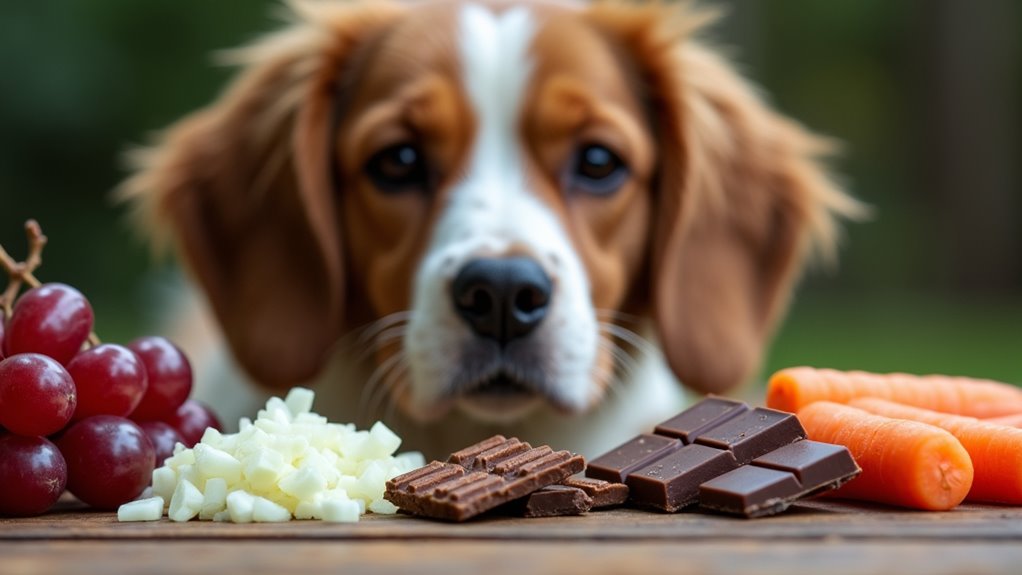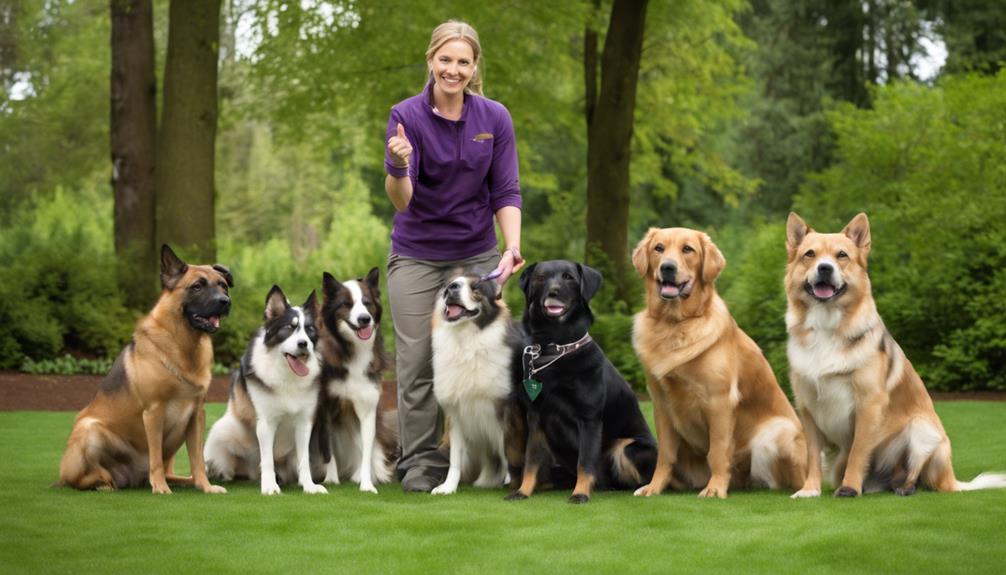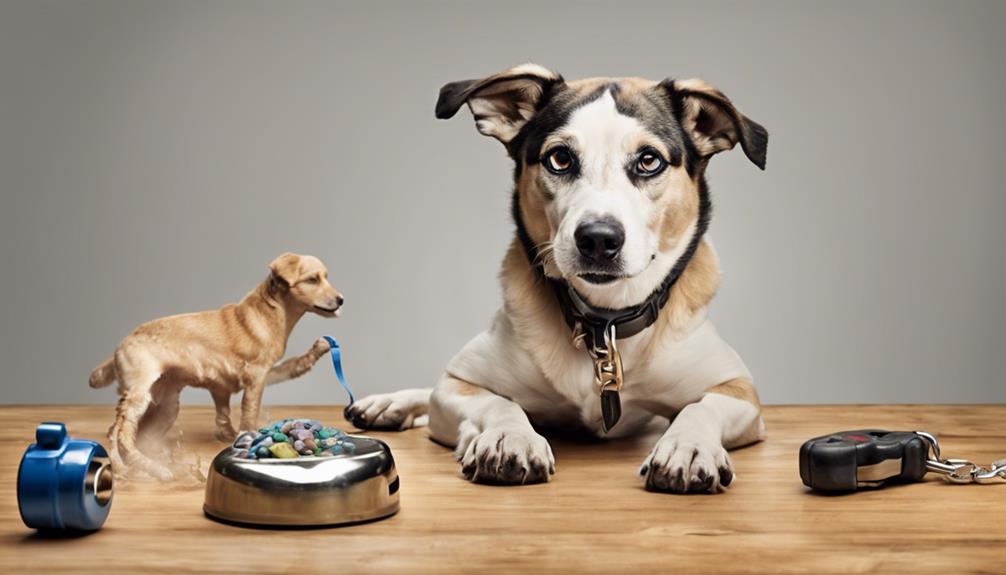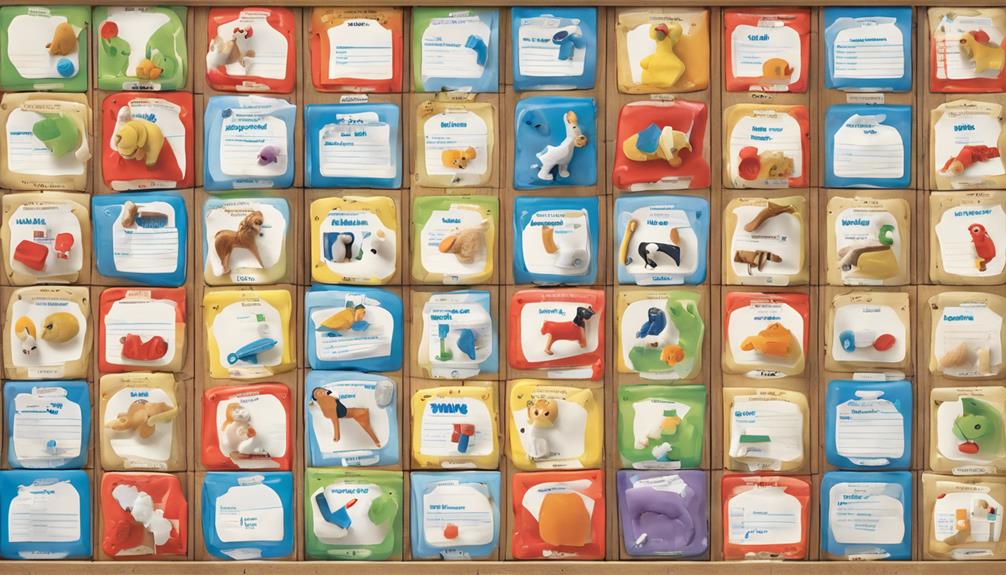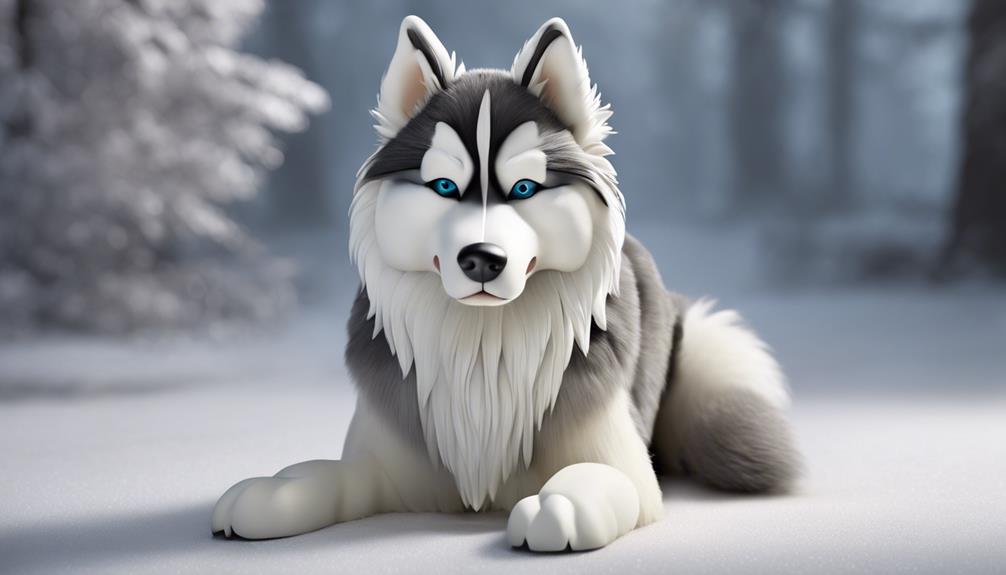Avoid sharing foods like chocolate, grapes, raisins, onions, garlic, chives, alcohol, and baked goods with your dog, as these contain toxic ingredients that can cause serious health problems or even be fatal. Stick to safe treats such as carrots, green beans, or apple slices (without seeds), and use specially made dog treats for snacks. To keep your pet safe and healthy, know exactly which foods to steer clear of — learn more to protect your furry friend.
Key Takeaways
- Avoid sharing grapes, raisins, chocolate, onions, garlic, and xylitol, as they are highly toxic to dogs.
- Never give dogs baked goods, candies, or foods with alcohol or toxic additives.
- Use safe alternatives like carrots, green beans, or apple slices (without seeds) for treats.
- Consult a veterinarian before introducing new foods to ensure they are safe for your dog.
- Keep hazardous foods and ingredients out of reach to prevent accidental ingestion.
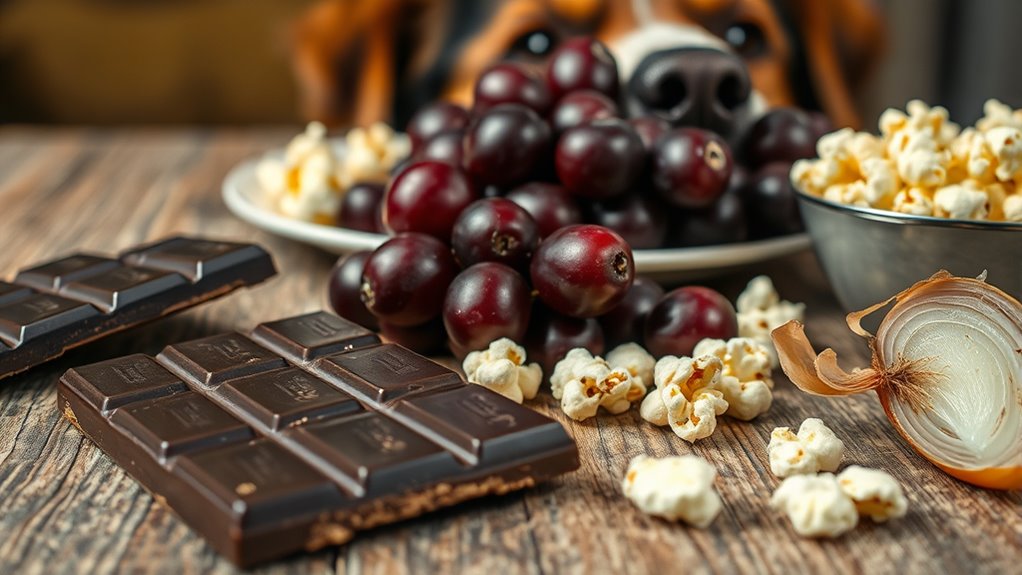
Sharing food with your dog might seem harmless, but many common human foods can be dangerous or even toxic to them. It’s essential to know which foods are safe and which are potential common food hazards that could compromise your pet’s health. While it’s tempting to share your snacks during mealtime or treat moments, not all foods are suitable for dogs. Some seemingly harmless treats, like certain fruits or baked goods, can cause digestive issues or poisoning.
Sharing human food with your dog can be dangerous; some treats may cause poisoning or health issues.
When considering dog safe snacks, it’s best to stick with options designed for their dietary needs. Fresh carrots, green beans, and apple slices (without seeds) are good choices that provide nutrition without risking health problems. Many fruits and vegetables are safe in moderation, but you should always research specific items beforehand, as some can cause allergies or stomach upset. For example, grapes and raisins are common food hazards that can lead to kidney failure in dogs. Similarly, onions, garlic, and chives contain compounds harmful to their red blood cells and should be completely avoided.
Chocolate, caffeine, and alcohol are other common food hazards that are highly toxic to dogs. Even small amounts of chocolate can cause symptoms like vomiting, diarrhea, rapid breathing, or seizures. Alcohol can lead to intoxication, coma, or death. Be cautious about baked goods, candies, and foods containing these ingredients, and always keep them out of your dog’s reach. Additionally, many people are unaware that some human foods contain toxic compounds that can be especially harmful to dogs.
Many people overlook the dangers of certain dairy products, like cheese or milk, which can cause stomach upset or pancreatitis if given excessively. Instead, opt for healthier, dog-safe treats like commercial dental chews or homemade options like frozen pumpkin or plain cooked chicken. These alternatives are safer and satisfy their craving for something tasty. Incorporating nutritional balance in their diet ensures they get essential nutrients without risking health issues. Understanding animal dietary needs can help you choose treats that support their overall well-being.
It’s indispensable to remember that just because a food is safe for humans doesn’t mean it’s safe for dogs. Always check reputable sources before offering a new treat. If you’re unsure whether a food is safe, consult your veterinarian. Additionally, understanding newborn care sleep patterns, bowel movements, and safety guidelines can help pet owners create a safe environment for their pets and family members alike. By being vigilant and choosing dog safe snacks over risky foods, you not only prevent accidental poisoning but also promote a healthier, happier life for your furry friend. Keep treats simple, natural, and specifically made for dogs, and avoid the temptation to share your human foods that could lead to health issues down the line.
Frequently Asked Questions
Can Some Human Foods Be Harmful to Specific Dog Breeds?
You might wonder if certain human foods harm specific dog breeds. It’s true that breed-specific sensitivities can influence how your dog reacts to some foods. Some breeds face breed-related poisoning risks from common foods like grapes or chocolate, which are generally safe for others. To keep your dog safe, research your breed’s particular vulnerabilities and avoid sharing potentially hazardous human foods. Always consult your vet for breed-specific dietary advice.
Are Cooked or Raw Foods More Dangerous for Dogs?
When choosing between cooked versus raw foods for your dog, raw foods often pose higher food safety concerns due to bacteria and parasites. Cooking helps eliminate these risks, making cooked foods generally safer. However, some believe raw diets offer benefits. You should weigh the potential dangers against nutritional needs, and always consult your vet. Prioritize food safety concerns to keep your dog healthy and avoid unnecessary health issues.
How Can I Tell if My Dog Has Ingested a Toxic Food?
Did you know that 80% of pet owners can’t identify poisoning symptoms in their dogs? If your dog has ingested toxic food, watch for symptoms of poisoning like vomiting, diarrhea, lethargy, or seizures. If these appear, seek emergency treatment steps immediately—call your vet or pet poison control. Quick action can save your dog’s life, so don’t delay if you suspect poisoning.
What Are the Signs of Food Poisoning in Dogs?
If you suspect your dog has food poisoning, watch for symptom recognition like vomiting, diarrhea, lethargy, or abdominal pain. These signs indicate a possible emergency response is required. Act quickly by removing food and water, and contact your vet immediately. Prompt action can prevent serious health issues and ensure your dog gets the care they need. Always stay alert to changes in your dog’s behavior for early detection.
Can Dogs Be Allergic to Certain Safe Human Foods?
In the days of dial-up internet, you might wonder if dogs can be allergic to certain safe human foods. The answer is yes; dog food allergies vary by individual and breed-specific sensitivities. Some dogs develop reactions to ingredients like wheat or dairy, so watch for itching or gastrointestinal issues. Always introduce new foods gradually, and consult your vet to identify potential allergies and find suitable, safe alternatives for your furry friend.
Conclusion
Remember, sharing your food can sometimes do more harm than good—think of it as the Trojan Horse of pet care. Stick to safe treats and avoid risky foods to keep your furry friend healthy and happy. Trust your instincts, and don’t let a moment of kindness turn into a Pandora’s box. After all, even the wisest of cats and the bravest of dogs know that true loyalty means protecting those we love, no matter what.
